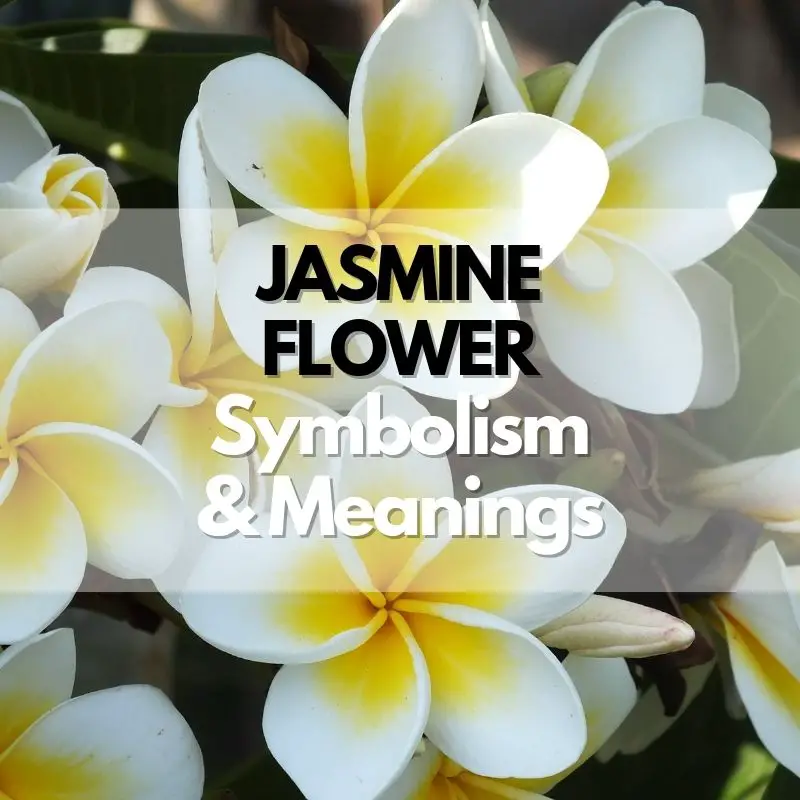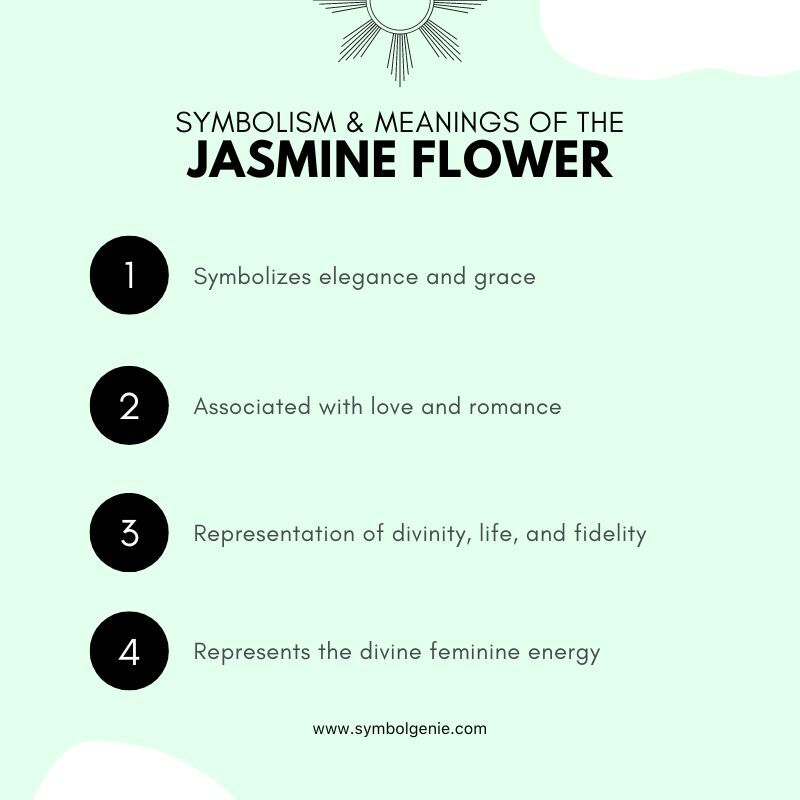Jasmine Flower: Symbolism, Meanings, and History

The jasmine flower has been used in art and literature for centuries to represent a wide range of emotions and ideas. From its delicate white petals to its sweet fragrance, the jasmine flower is often associated with purity, innocence, and elegance. In Chinese culture, the jasmine flower is also a symbol of summer and is often used in wedding ceremonies. In this article, we will take a closer look at the jasmine flower, its history and uses, and what it symbolizes.
What Is a Jasmine Flower?
Jasmine is a flowering plant that is part of the olive family. Its scientific name is Jasminum officinale, and it is native to tropical and temperate regions of Asia, Africa, and Europe. The plant has been cultivated for centuries for its beautiful white flowers, which have a sweet, intoxicating scent. Jasmine is used in many perfumes and cosmetics, and is also a popular flavoring for tea. In the language of flowers, jasmine symbolizes love, purity, and grace.
The History of Jasmine Flower
Jasmine flowers have been around for centuries and have been mentioned in ancient texts. The name jasmine is derived from the Persian word yasemin, which means gift from God. Jasmine flowers are native to tropical and warm temperate regions of the Old World. The Jasmine Flower is most commonly found in China, India, and South Africa.
The Jasmine flower symbolizes many things such as love, purity, elegance, and gracefulness. In some cultures, the jasmine flower is also known to represent motherhood. Jasmine flowers are often used in wedding bouquets and other arrangements because of their beautiful scent.
Jasmine flowers can be white or yellow in color and they usually bloom in the summertime. The jasmine plant can grow to be up to 15 feet tall and it produces small berries that are poisonous if ingested. When picking jasmine flowers, it is important to choose ones that are fully open so that they will release their fragrance when placed in water.

Jasmine Flower Symbolism and Meanings
Jasmine flowers are one of the most popular flowers in the world. They are known for their fragrance and beauty. Jasmine flowers have many different meanings and symbolism. Here are some of the most common meanings of jasmine flowers:
- Symbol of love: Jasmine flowers are often given to loved ones as a sign of affection. They can also be given to new couples as a symbol of love and fidelity.
- Symbol of purity: Jasmine flowers represent purity, innocence, and chastity. They are often used in wedding ceremonies to represent the purity of the bride and groom.
- Symbol of luck: In many cultures, jasmine flowers are seen as a symbol of good luck. They are often given to people who are starting new ventures or embarking on new journeys.
The Spiritual Meaning of a Jasmine Flower
The spiritual meaning of flowers has been a topic of interest for centuries. People from all walks of life have been drawn to the beauty and mystery of flowers and their connection to the spirit world. The Jasmine Flower is no exception. This aromatic flower has been used in religious ceremonies and is said to have a range of spiritual benefits.
Jasmine is commonly associated with purity, innocence, and new beginnings. The delicate white flowers are said to represent the purity of the soul, while the sweet fragrance is said to represent the innocence of the heart. Jasmine is also associated with new beginnings, as the flowers are often used in weddings and other special occasions.
The spiritual benefits of Jasmine Flower are said to include:
- Purification of the soul
- Protection from negative energy
- Attraction of positive energy
- Balance of the chakras
- Increased spiritual awareness
Uses of Jasmine Flower
Jasmine flowers are not only beautiful, but they also have many uses. Jasmine flowers can be used for many things, such as making tea, perfume, and oil.
The primary use for jasmine flowers is to make tea. Jasmine tea is a type of green tea that is made with jasmine flowers. Jasmine tea has many health benefits, such as reducing stress, boosting immunity, and helping with weight loss. Jasmine tea is also said to be good for the skin.
Here are some other ways you can use jasmine flowers:
- Make a perfume or oil. Jasmine flowers can be used to make a perfume or oil.
- Put them in your hair. Jasmine flowers can be used to make a fragrant hair oil.
- Make a facial steam. Jasmine flowers can be used to make a facial steam.
- Add them to a bath. Jasmine flowers can be used to make a relaxing bath.
Jasmine Flower Tattoo Meaning
Jasmine flower tattoos are very popular among women. The jasmine flower tattoo is a symbol of purity, innocence, and femininity. Jasmine flowers are also associated with motherhood due to their ability to provide comfort and support. Jasmine flower tattoos can be designed in a variety of ways, including as a stand-alone tattoo or as part of a larger tattoo design. Jasmine flower tattoos can be worn on any part of the body, but are commonly seen on the back, shoulders, ankles, and feet.
Believe it or not, the jasmine flower tattoo is also a popular choice for men. While the jasmine flower tattoo is often seen as a feminine tattoo, it can also be very masculine. Jasmine flower tattoos for men are usually larger in size than those for women and are often seen on the chest, back, arms, and legs.
Jasmine Flower Essential Oil Meaning
Jasmine Flower essential oil is beneficial for its calming and soothing properties. The oil is extracted from the Jasmine Flower plant through a process of steam distillation. The Jasmine Flower plant is native to Asia and has been used in traditional Chinese medicine for centuries.
The physical benefits of Jasmine Flower essential oil include its ability to help reduce anxiety, stress, and depression. The oil is also said to help improve sleep quality and promote healthy skin.
The meanings of Jasmine Flower essential oil vary depending on the culture. In China, Jasmine Flower is associated with wealth, prosperity, and good fortune. In India, Jasmine Flower is associated with love, romance, and sensuality.
Conclusion
Jasmine flowers have been symbols of love and hope for centuries. The delicate and sweet-smelling flowers have also been associated with purity, innocence, and new beginnings.
As you can see, the Jasmine flower is a symbol of many things. Whether it is love, hope, or purity, the Jasmine flower is a beautiful reminder of the good in the world.